Unilever's Strategies for Managing Quality Amidst Brexit Challenges
VerifiedAdded on 2023/06/14
|7
|1630
|244
Report
AI Summary
This report assesses the impact of Brexit on Unilever's quality management, focusing on challenges like food standard changes, supply chain disruptions, and workforce issues. It identifies problems such as excess documentation, resource constraints, and supply chain complexity. The report elaborates on Unilever's use of quality management theories like Six Sigma and Total Quality Management (TQM) to improve efficiency and solve problems. Six Sigma helps eliminate defects, while TQM emphasizes customer satisfaction and continuous improvement. The conclusion highlights the importance of effective management and quality control for maintaining competitiveness in the face of Brexit-related obstacles. Desklib provides a platform for students to access similar solved assignments and past papers.
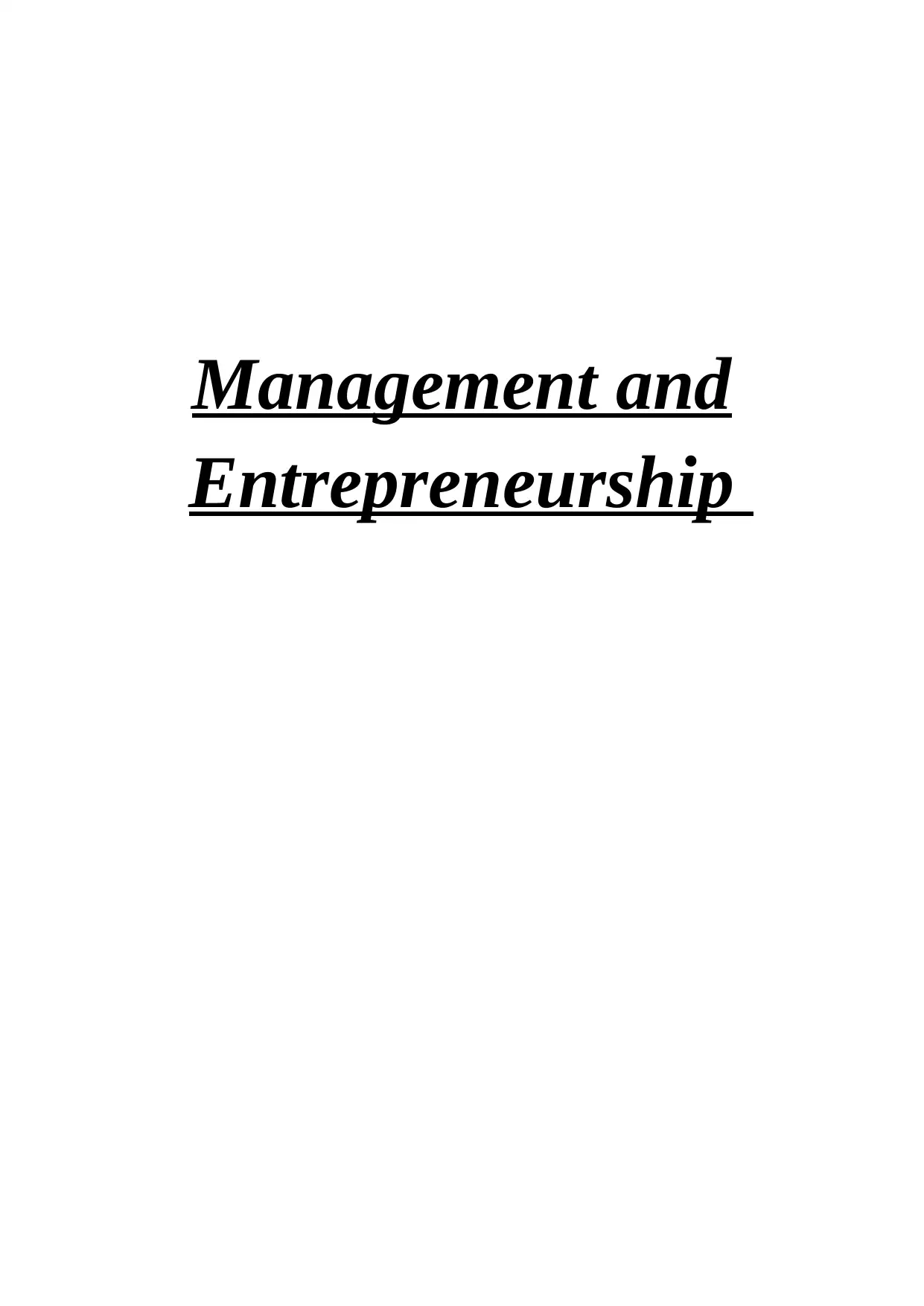
Management and
Entrepreneurship
Entrepreneurship
Paraphrase This Document
Need a fresh take? Get an instant paraphrase of this document with our AI Paraphraser
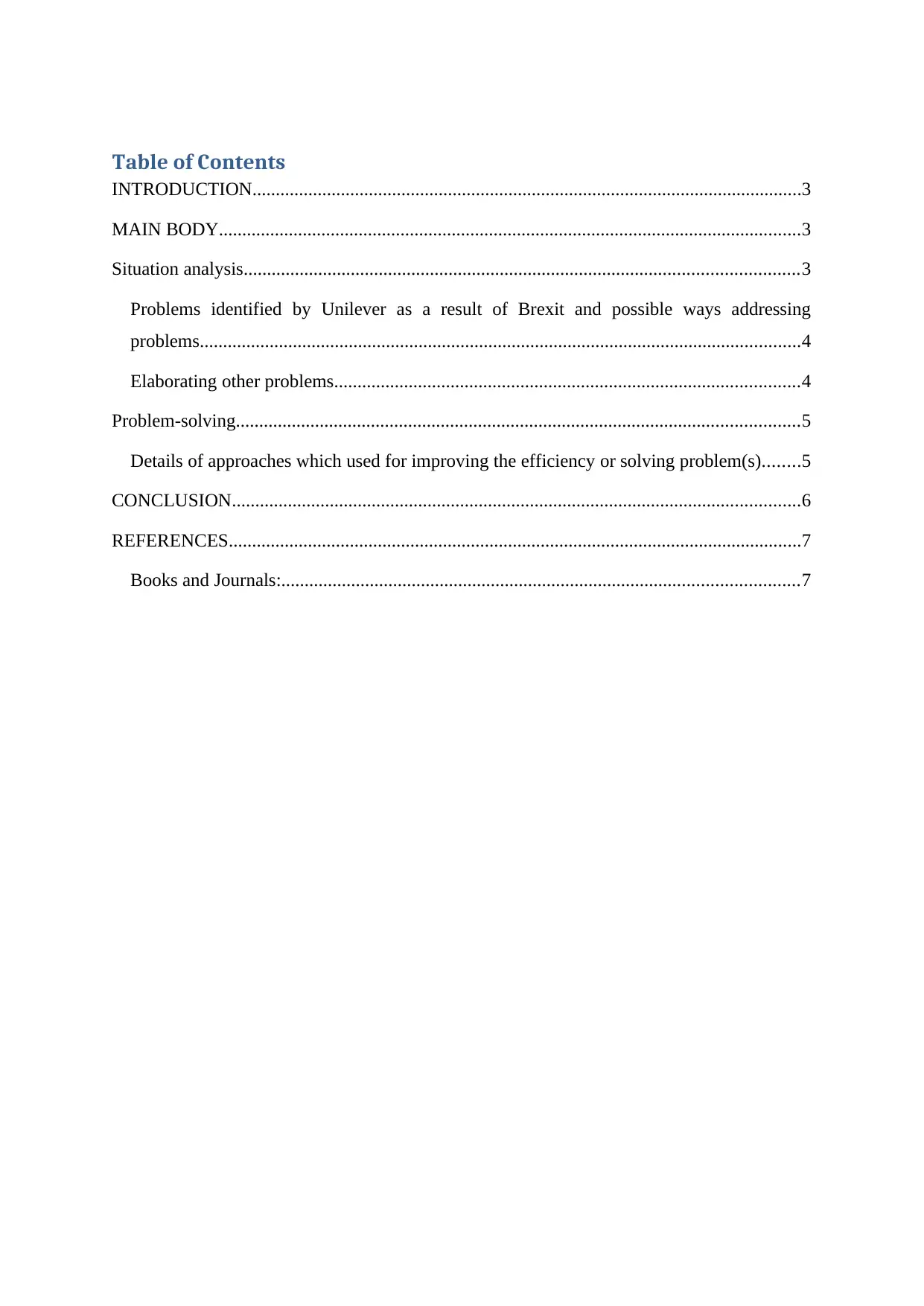
Table of Contents
INTRODUCTION......................................................................................................................3
MAIN BODY.............................................................................................................................3
Situation analysis.......................................................................................................................3
Problems identified by Unilever as a result of Brexit and possible ways addressing
problems.................................................................................................................................4
Elaborating other problems....................................................................................................4
Problem-solving.........................................................................................................................5
Details of approaches which used for improving the efficiency or solving problem(s)........5
CONCLUSION..........................................................................................................................6
REFERENCES...........................................................................................................................7
Books and Journals:...............................................................................................................7
INTRODUCTION......................................................................................................................3
MAIN BODY.............................................................................................................................3
Situation analysis.......................................................................................................................3
Problems identified by Unilever as a result of Brexit and possible ways addressing
problems.................................................................................................................................4
Elaborating other problems....................................................................................................4
Problem-solving.........................................................................................................................5
Details of approaches which used for improving the efficiency or solving problem(s)........5
CONCLUSION..........................................................................................................................6
REFERENCES...........................................................................................................................7
Books and Journals:...............................................................................................................7
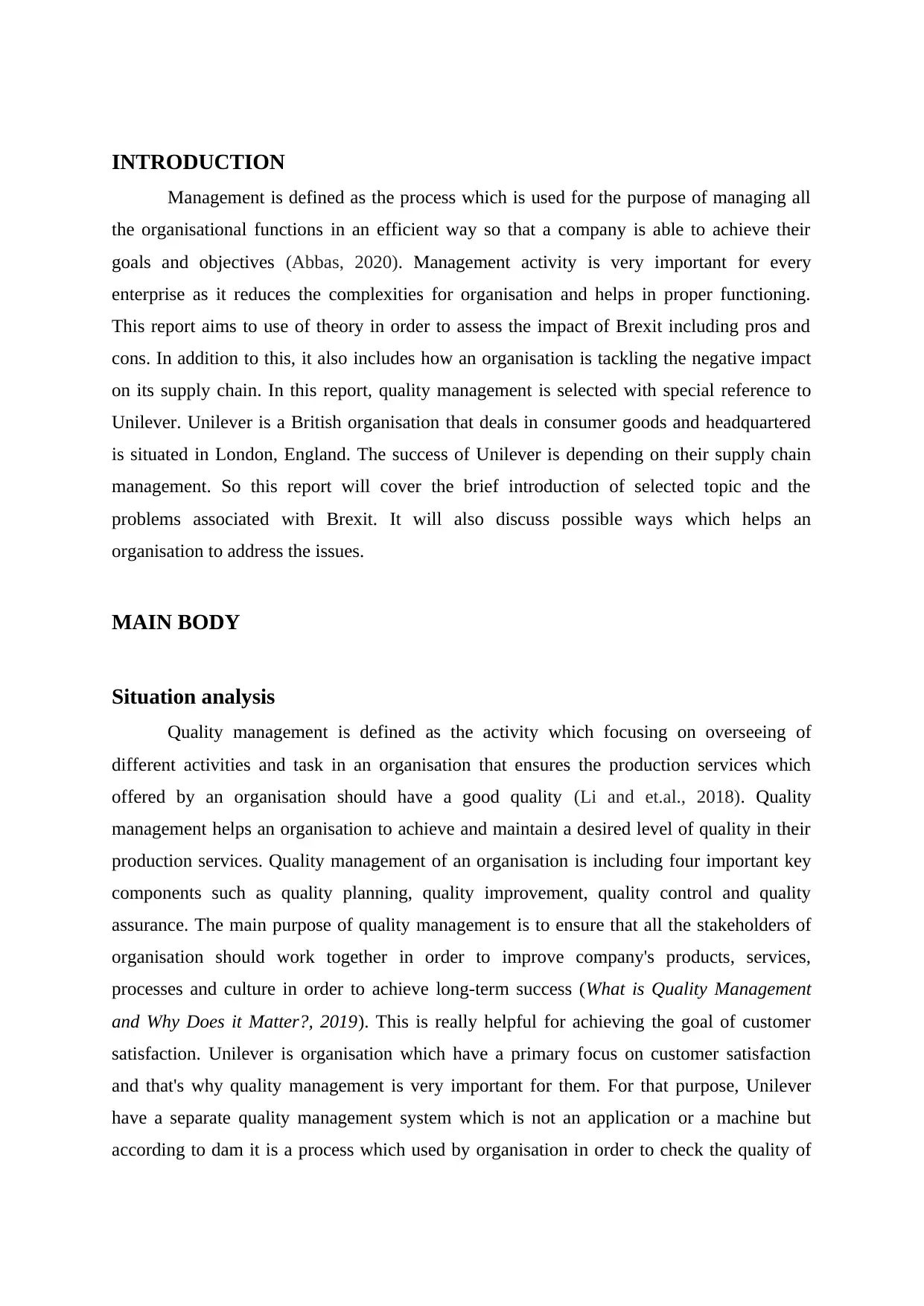
INTRODUCTION
Management is defined as the process which is used for the purpose of managing all
the organisational functions in an efficient way so that a company is able to achieve their
goals and objectives (Abbas, 2020). Management activity is very important for every
enterprise as it reduces the complexities for organisation and helps in proper functioning.
This report aims to use of theory in order to assess the impact of Brexit including pros and
cons. In addition to this, it also includes how an organisation is tackling the negative impact
on its supply chain. In this report, quality management is selected with special reference to
Unilever. Unilever is a British organisation that deals in consumer goods and headquartered
is situated in London, England. The success of Unilever is depending on their supply chain
management. So this report will cover the brief introduction of selected topic and the
problems associated with Brexit. It will also discuss possible ways which helps an
organisation to address the issues.
MAIN BODY
Situation analysis
Quality management is defined as the activity which focusing on overseeing of
different activities and task in an organisation that ensures the production services which
offered by an organisation should have a good quality (Li and et.al., 2018). Quality
management helps an organisation to achieve and maintain a desired level of quality in their
production services. Quality management of an organisation is including four important key
components such as quality planning, quality improvement, quality control and quality
assurance. The main purpose of quality management is to ensure that all the stakeholders of
organisation should work together in order to improve company's products, services,
processes and culture in order to achieve long-term success (What is Quality Management
and Why Does it Matter?, 2019). This is really helpful for achieving the goal of customer
satisfaction. Unilever is organisation which have a primary focus on customer satisfaction
and that's why quality management is very important for them. For that purpose, Unilever
have a separate quality management system which is not an application or a machine but
according to dam it is a process which used by organisation in order to check the quality of
Management is defined as the process which is used for the purpose of managing all
the organisational functions in an efficient way so that a company is able to achieve their
goals and objectives (Abbas, 2020). Management activity is very important for every
enterprise as it reduces the complexities for organisation and helps in proper functioning.
This report aims to use of theory in order to assess the impact of Brexit including pros and
cons. In addition to this, it also includes how an organisation is tackling the negative impact
on its supply chain. In this report, quality management is selected with special reference to
Unilever. Unilever is a British organisation that deals in consumer goods and headquartered
is situated in London, England. The success of Unilever is depending on their supply chain
management. So this report will cover the brief introduction of selected topic and the
problems associated with Brexit. It will also discuss possible ways which helps an
organisation to address the issues.
MAIN BODY
Situation analysis
Quality management is defined as the activity which focusing on overseeing of
different activities and task in an organisation that ensures the production services which
offered by an organisation should have a good quality (Li and et.al., 2018). Quality
management helps an organisation to achieve and maintain a desired level of quality in their
production services. Quality management of an organisation is including four important key
components such as quality planning, quality improvement, quality control and quality
assurance. The main purpose of quality management is to ensure that all the stakeholders of
organisation should work together in order to improve company's products, services,
processes and culture in order to achieve long-term success (What is Quality Management
and Why Does it Matter?, 2019). This is really helpful for achieving the goal of customer
satisfaction. Unilever is organisation which have a primary focus on customer satisfaction
and that's why quality management is very important for them. For that purpose, Unilever
have a separate quality management system which is not an application or a machine but
according to dam it is a process which used by organisation in order to check the quality of
⊘ This is a preview!⊘
Do you want full access?
Subscribe today to unlock all pages.

Trusted by 1+ million students worldwide
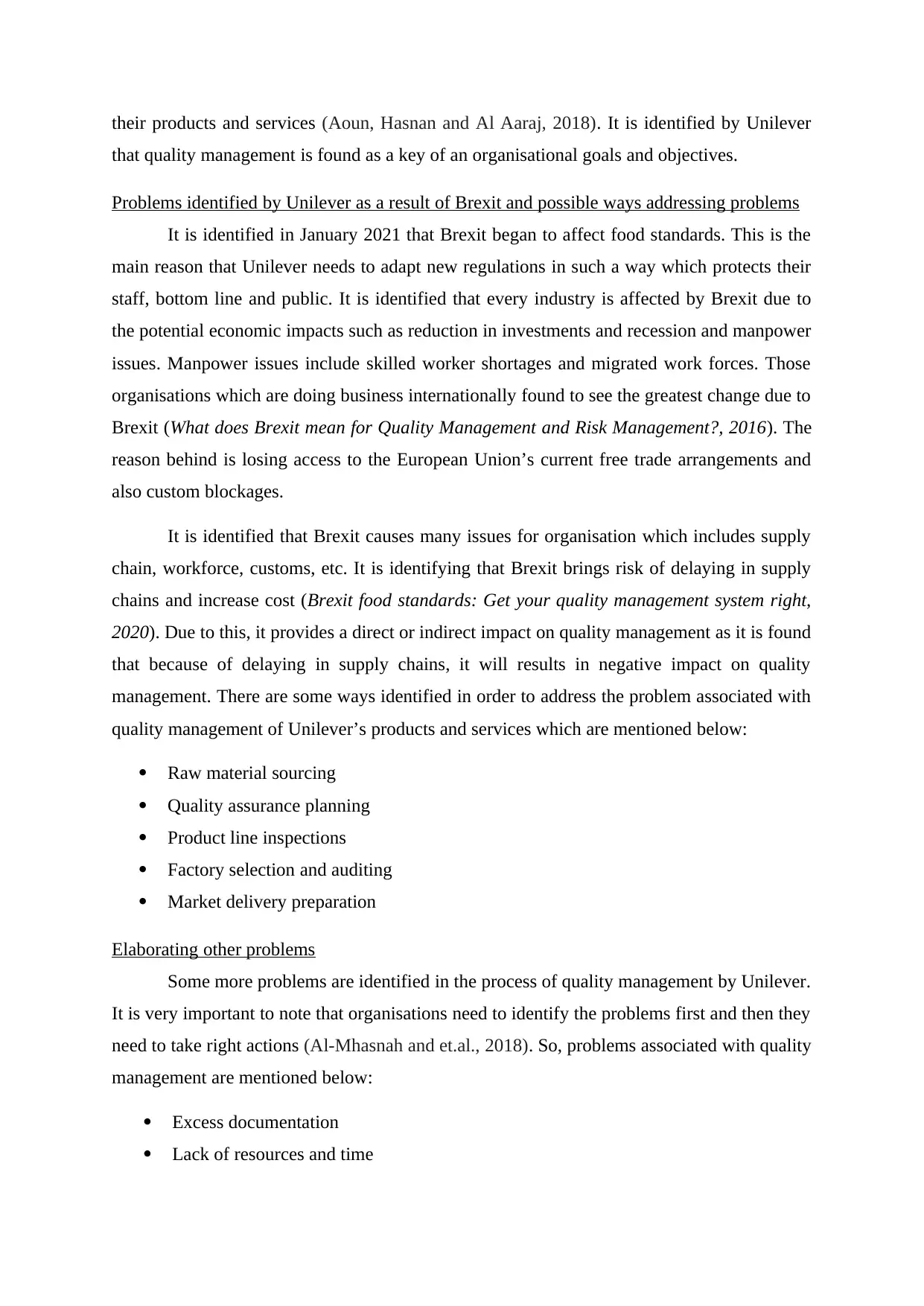
their products and services (Aoun, Hasnan and Al Aaraj, 2018). It is identified by Unilever
that quality management is found as a key of an organisational goals and objectives.
Problems identified by Unilever as a result of Brexit and possible ways addressing problems
It is identified in January 2021 that Brexit began to affect food standards. This is the
main reason that Unilever needs to adapt new regulations in such a way which protects their
staff, bottom line and public. It is identified that every industry is affected by Brexit due to
the potential economic impacts such as reduction in investments and recession and manpower
issues. Manpower issues include skilled worker shortages and migrated work forces. Those
organisations which are doing business internationally found to see the greatest change due to
Brexit (What does Brexit mean for Quality Management and Risk Management?, 2016). The
reason behind is losing access to the European Union’s current free trade arrangements and
also custom blockages.
It is identified that Brexit causes many issues for organisation which includes supply
chain, workforce, customs, etc. It is identifying that Brexit brings risk of delaying in supply
chains and increase cost (Brexit food standards: Get your quality management system right,
2020). Due to this, it provides a direct or indirect impact on quality management as it is found
that because of delaying in supply chains, it will results in negative impact on quality
management. There are some ways identified in order to address the problem associated with
quality management of Unilever’s products and services which are mentioned below:
Raw material sourcing
Quality assurance planning
Product line inspections
Factory selection and auditing
Market delivery preparation
Elaborating other problems
Some more problems are identified in the process of quality management by Unilever.
It is very important to note that organisations need to identify the problems first and then they
need to take right actions (Al-Mhasnah and et.al., 2018). So, problems associated with quality
management are mentioned below:
Excess documentation
Lack of resources and time
that quality management is found as a key of an organisational goals and objectives.
Problems identified by Unilever as a result of Brexit and possible ways addressing problems
It is identified in January 2021 that Brexit began to affect food standards. This is the
main reason that Unilever needs to adapt new regulations in such a way which protects their
staff, bottom line and public. It is identified that every industry is affected by Brexit due to
the potential economic impacts such as reduction in investments and recession and manpower
issues. Manpower issues include skilled worker shortages and migrated work forces. Those
organisations which are doing business internationally found to see the greatest change due to
Brexit (What does Brexit mean for Quality Management and Risk Management?, 2016). The
reason behind is losing access to the European Union’s current free trade arrangements and
also custom blockages.
It is identified that Brexit causes many issues for organisation which includes supply
chain, workforce, customs, etc. It is identifying that Brexit brings risk of delaying in supply
chains and increase cost (Brexit food standards: Get your quality management system right,
2020). Due to this, it provides a direct or indirect impact on quality management as it is found
that because of delaying in supply chains, it will results in negative impact on quality
management. There are some ways identified in order to address the problem associated with
quality management of Unilever’s products and services which are mentioned below:
Raw material sourcing
Quality assurance planning
Product line inspections
Factory selection and auditing
Market delivery preparation
Elaborating other problems
Some more problems are identified in the process of quality management by Unilever.
It is very important to note that organisations need to identify the problems first and then they
need to take right actions (Al-Mhasnah and et.al., 2018). So, problems associated with quality
management are mentioned below:
Excess documentation
Lack of resources and time
Paraphrase This Document
Need a fresh take? Get an instant paraphrase of this document with our AI Paraphraser
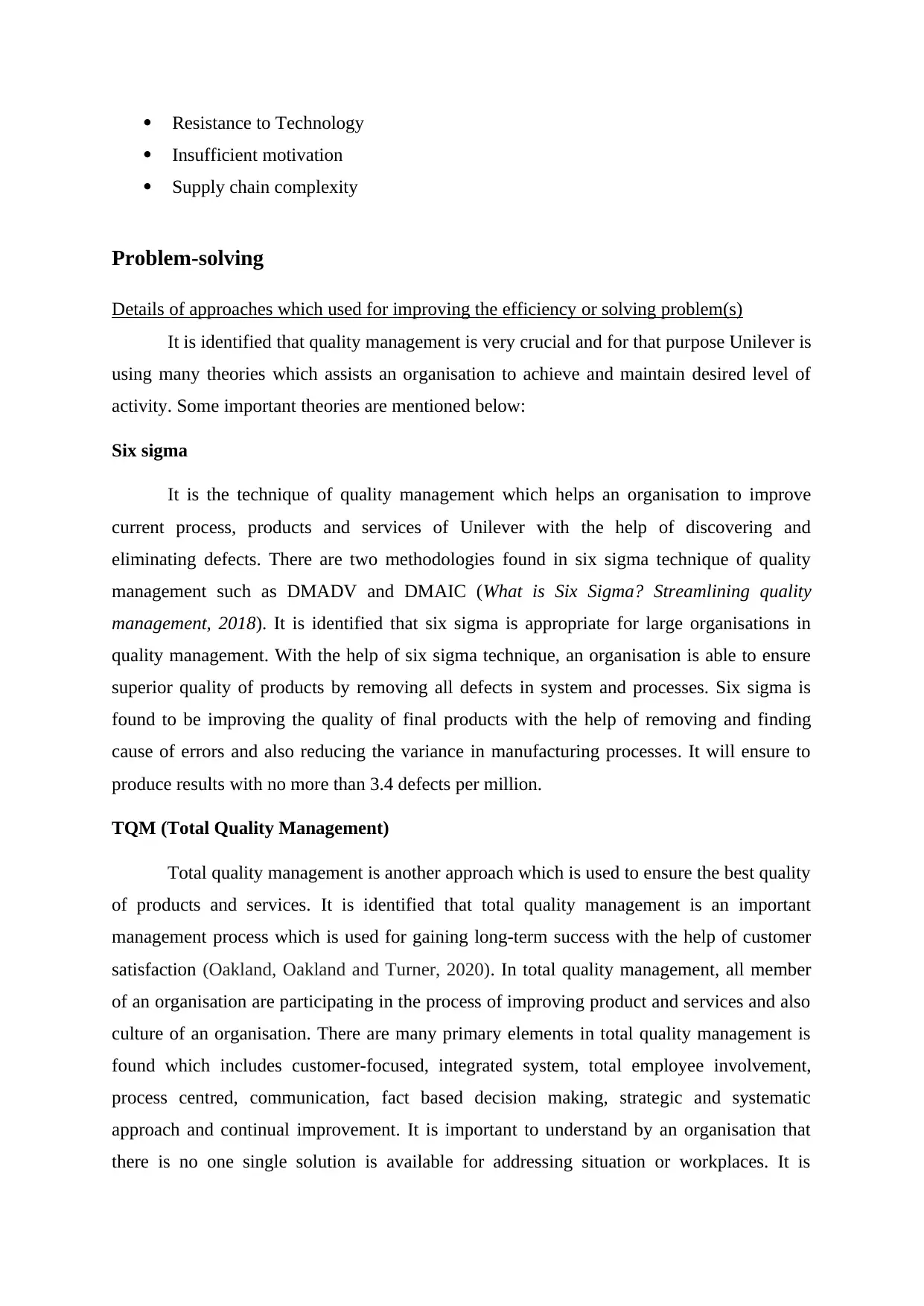
Resistance to Technology
Insufficient motivation
Supply chain complexity
Problem-solving
Details of approaches which used for improving the efficiency or solving problem(s)
It is identified that quality management is very crucial and for that purpose Unilever is
using many theories which assists an organisation to achieve and maintain desired level of
activity. Some important theories are mentioned below:
Six sigma
It is the technique of quality management which helps an organisation to improve
current process, products and services of Unilever with the help of discovering and
eliminating defects. There are two methodologies found in six sigma technique of quality
management such as DMADV and DMAIC (What is Six Sigma? Streamlining quality
management, 2018). It is identified that six sigma is appropriate for large organisations in
quality management. With the help of six sigma technique, an organisation is able to ensure
superior quality of products by removing all defects in system and processes. Six sigma is
found to be improving the quality of final products with the help of removing and finding
cause of errors and also reducing the variance in manufacturing processes. It will ensure to
produce results with no more than 3.4 defects per million.
TQM (Total Quality Management)
Total quality management is another approach which is used to ensure the best quality
of products and services. It is identified that total quality management is an important
management process which is used for gaining long-term success with the help of customer
satisfaction (Oakland, Oakland and Turner, 2020). In total quality management, all member
of an organisation are participating in the process of improving product and services and also
culture of an organisation. There are many primary elements in total quality management is
found which includes customer-focused, integrated system, total employee involvement,
process centred, communication, fact based decision making, strategic and systematic
approach and continual improvement. It is important to understand by an organisation that
there is no one single solution is available for addressing situation or workplaces. It is
Insufficient motivation
Supply chain complexity
Problem-solving
Details of approaches which used for improving the efficiency or solving problem(s)
It is identified that quality management is very crucial and for that purpose Unilever is
using many theories which assists an organisation to achieve and maintain desired level of
activity. Some important theories are mentioned below:
Six sigma
It is the technique of quality management which helps an organisation to improve
current process, products and services of Unilever with the help of discovering and
eliminating defects. There are two methodologies found in six sigma technique of quality
management such as DMADV and DMAIC (What is Six Sigma? Streamlining quality
management, 2018). It is identified that six sigma is appropriate for large organisations in
quality management. With the help of six sigma technique, an organisation is able to ensure
superior quality of products by removing all defects in system and processes. Six sigma is
found to be improving the quality of final products with the help of removing and finding
cause of errors and also reducing the variance in manufacturing processes. It will ensure to
produce results with no more than 3.4 defects per million.
TQM (Total Quality Management)
Total quality management is another approach which is used to ensure the best quality
of products and services. It is identified that total quality management is an important
management process which is used for gaining long-term success with the help of customer
satisfaction (Oakland, Oakland and Turner, 2020). In total quality management, all member
of an organisation are participating in the process of improving product and services and also
culture of an organisation. There are many primary elements in total quality management is
found which includes customer-focused, integrated system, total employee involvement,
process centred, communication, fact based decision making, strategic and systematic
approach and continual improvement. It is important to understand by an organisation that
there is no one single solution is available for addressing situation or workplaces. It is
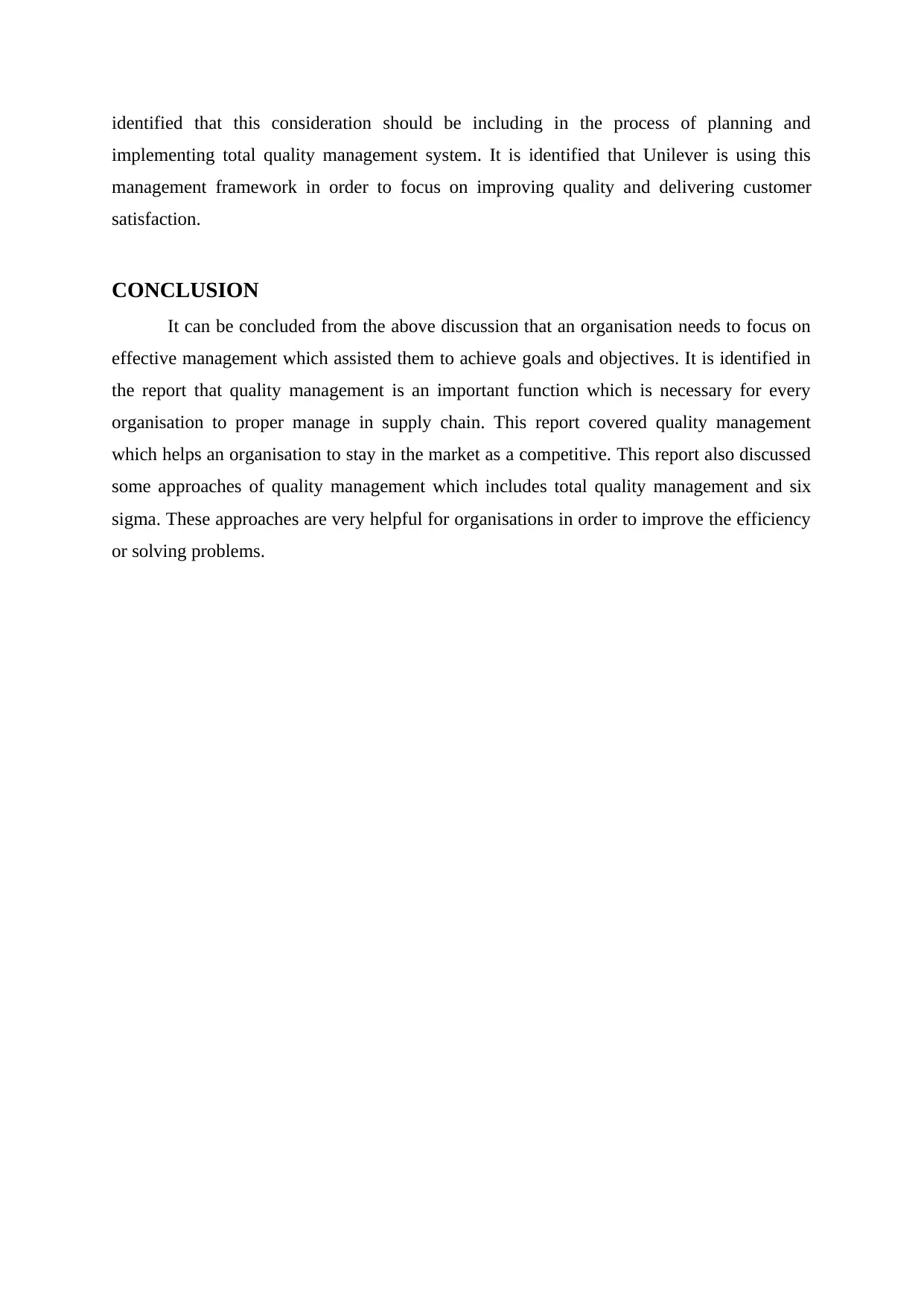
identified that this consideration should be including in the process of planning and
implementing total quality management system. It is identified that Unilever is using this
management framework in order to focus on improving quality and delivering customer
satisfaction.
CONCLUSION
It can be concluded from the above discussion that an organisation needs to focus on
effective management which assisted them to achieve goals and objectives. It is identified in
the report that quality management is an important function which is necessary for every
organisation to proper manage in supply chain. This report covered quality management
which helps an organisation to stay in the market as a competitive. This report also discussed
some approaches of quality management which includes total quality management and six
sigma. These approaches are very helpful for organisations in order to improve the efficiency
or solving problems.
implementing total quality management system. It is identified that Unilever is using this
management framework in order to focus on improving quality and delivering customer
satisfaction.
CONCLUSION
It can be concluded from the above discussion that an organisation needs to focus on
effective management which assisted them to achieve goals and objectives. It is identified in
the report that quality management is an important function which is necessary for every
organisation to proper manage in supply chain. This report covered quality management
which helps an organisation to stay in the market as a competitive. This report also discussed
some approaches of quality management which includes total quality management and six
sigma. These approaches are very helpful for organisations in order to improve the efficiency
or solving problems.
⊘ This is a preview!⊘
Do you want full access?
Subscribe today to unlock all pages.

Trusted by 1+ million students worldwide
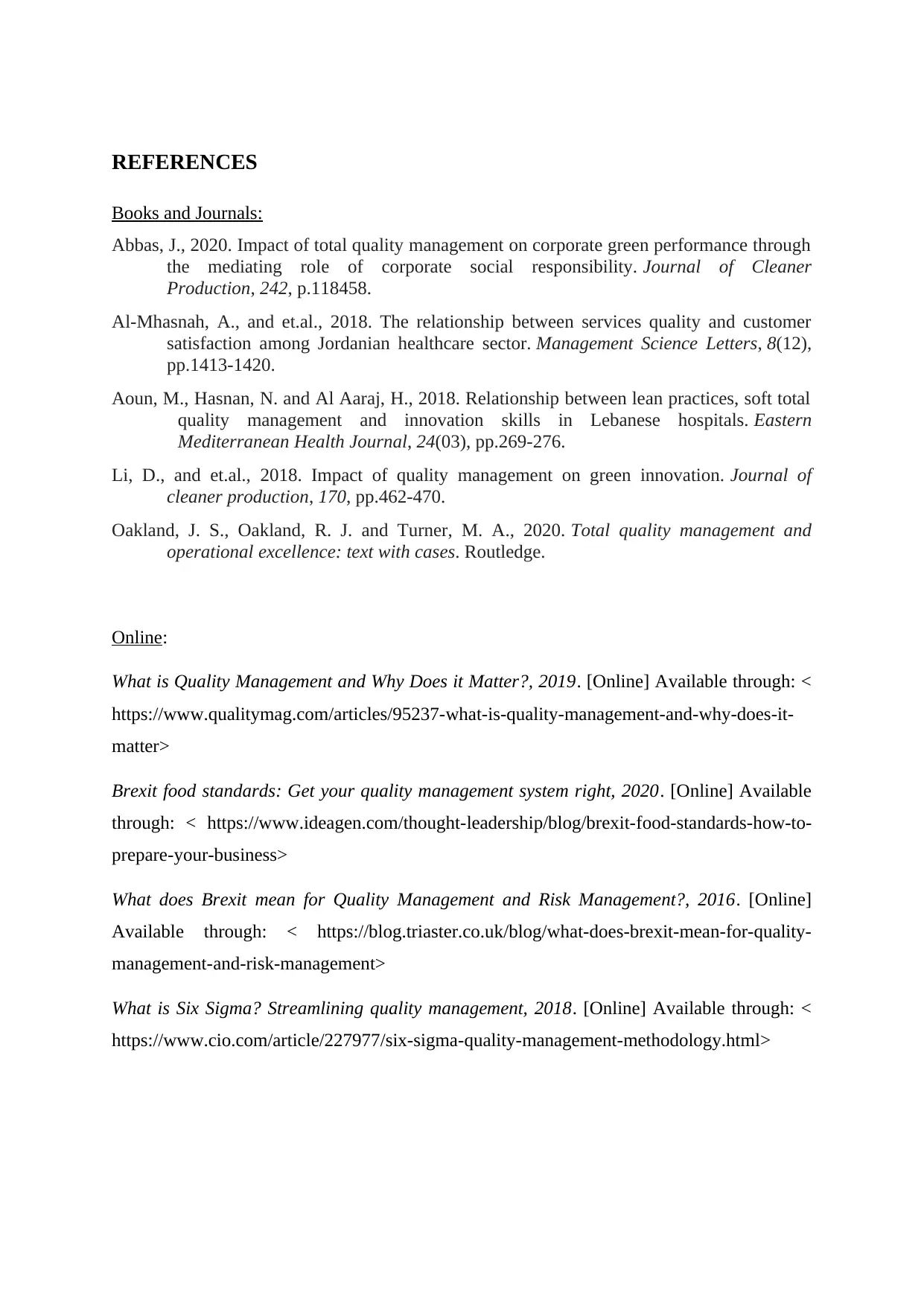
REFERENCES
Books and Journals:
Abbas, J., 2020. Impact of total quality management on corporate green performance through
the mediating role of corporate social responsibility. Journal of Cleaner
Production, 242, p.118458.
Al-Mhasnah, A., and et.al., 2018. The relationship between services quality and customer
satisfaction among Jordanian healthcare sector. Management Science Letters, 8(12),
pp.1413-1420.
Aoun, M., Hasnan, N. and Al Aaraj, H., 2018. Relationship between lean practices, soft total
quality management and innovation skills in Lebanese hospitals. Eastern
Mediterranean Health Journal, 24(03), pp.269-276.
Li, D., and et.al., 2018. Impact of quality management on green innovation. Journal of
cleaner production, 170, pp.462-470.
Oakland, J. S., Oakland, R. J. and Turner, M. A., 2020. Total quality management and
operational excellence: text with cases. Routledge.
Online:
What is Quality Management and Why Does it Matter?, 2019. [Online] Available through: <
https://www.qualitymag.com/articles/95237-what-is-quality-management-and-why-does-it-
matter>
Brexit food standards: Get your quality management system right, 2020. [Online] Available
through: < https://www.ideagen.com/thought-leadership/blog/brexit-food-standards-how-to-
prepare-your-business>
What does Brexit mean for Quality Management and Risk Management?, 2016. [Online]
Available through: < https://blog.triaster.co.uk/blog/what-does-brexit-mean-for-quality-
management-and-risk-management>
What is Six Sigma? Streamlining quality management, 2018. [Online] Available through: <
https://www.cio.com/article/227977/six-sigma-quality-management-methodology.html>
Books and Journals:
Abbas, J., 2020. Impact of total quality management on corporate green performance through
the mediating role of corporate social responsibility. Journal of Cleaner
Production, 242, p.118458.
Al-Mhasnah, A., and et.al., 2018. The relationship between services quality and customer
satisfaction among Jordanian healthcare sector. Management Science Letters, 8(12),
pp.1413-1420.
Aoun, M., Hasnan, N. and Al Aaraj, H., 2018. Relationship between lean practices, soft total
quality management and innovation skills in Lebanese hospitals. Eastern
Mediterranean Health Journal, 24(03), pp.269-276.
Li, D., and et.al., 2018. Impact of quality management on green innovation. Journal of
cleaner production, 170, pp.462-470.
Oakland, J. S., Oakland, R. J. and Turner, M. A., 2020. Total quality management and
operational excellence: text with cases. Routledge.
Online:
What is Quality Management and Why Does it Matter?, 2019. [Online] Available through: <
https://www.qualitymag.com/articles/95237-what-is-quality-management-and-why-does-it-
matter>
Brexit food standards: Get your quality management system right, 2020. [Online] Available
through: < https://www.ideagen.com/thought-leadership/blog/brexit-food-standards-how-to-
prepare-your-business>
What does Brexit mean for Quality Management and Risk Management?, 2016. [Online]
Available through: < https://blog.triaster.co.uk/blog/what-does-brexit-mean-for-quality-
management-and-risk-management>
What is Six Sigma? Streamlining quality management, 2018. [Online] Available through: <
https://www.cio.com/article/227977/six-sigma-quality-management-methodology.html>
1 out of 7
Related Documents
Your All-in-One AI-Powered Toolkit for Academic Success.
+13062052269
info@desklib.com
Available 24*7 on WhatsApp / Email
![[object Object]](/_next/static/media/star-bottom.7253800d.svg)
Unlock your academic potential
Copyright © 2020–2025 A2Z Services. All Rights Reserved. Developed and managed by ZUCOL.





